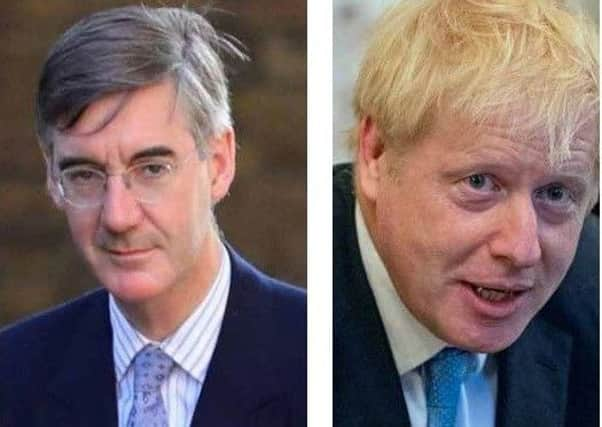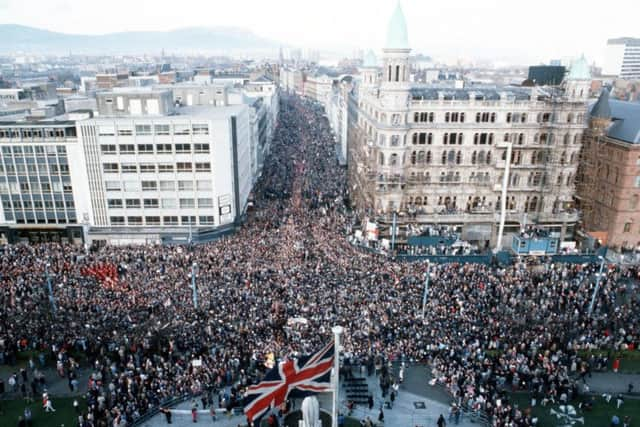Ben Lowry: Middle England hadn’t before been asked if it saw Northern Ireland as fully in UK but when it was, Brexit was more important


The November 1985 diktat, as unionists called it, was signed by Margaret Thatcher a year after she said ‘out, out, out’ to three Dublin options for Northern Ireland — unity, joint authority, and a two-state federation.
The 1985 deal, signed by Garret Fitzgerald, gave the Republic a consultative say in running of NI.
Advertisement
Hide AdAdvertisement
Hide AdI was 13 then, and at a school that had Saturday classes. I bunked off afternoon games to go to the huge anti agreement rally at City Hall.


Some of the rally I remember clearly, such as being close to the 1960s corner building with a clock, opposite Robinson and Cleaver, at the corner of Donegall Square North and Donegall Place, where the crowd was crammed in a way that today would spark safety fears.
For some reason I recall a middle aged woman in the packed crowd wearing a DUP 1, 2, 3 sticker.
The concept of giving Dublin a say in NI at a time when it was perceived to be doing little to stop a long terrorist campaign, was easy even for a teenager to understand.
Advertisement
Hide AdAdvertisement
Hide AdYet I have only fully come to grasp the AIA’s significance decades later, both the long-term intentions of the signatories, UK/Ireland, and its impact.
It also took a while to see what its signing said about the preceding failures of unionist leaders, and what the response to the AIA said about loyalism’s declining power.
Not infrequently in 2019 we report on developments that have their origins in 1985, such as the recent episode in which the Taoiseach visited Hillsborough Castle without being hosted by a Secretary of State, days after the NIO advisor, Lord Caine, who had always insisted on such accompaniment, was not kept on his post.
Despite the inappropriate circumstances of his visit, Leo Varadkar then used British state property to publicly attack a UK government that was not there to defend itself.
Advertisement
Hide AdAdvertisement
Hide AdAs is the enduring pattern of NIO and British weakness in the face of such relentless Irish partisanship, London stayed politely silent in response to this subtle over reach.
A well connected Westminster figure tells me that unionism, whatever its present difficulties, is in a better position than 1985, when it had few friends in the House of Commons, hence why NI MPs were unaware of the coming Thatcher volte face.
There are now younger Tory MPs who grew up through the Troubles, or older ones who served here, who instinctively view NI as British.
Another difference between the AIA and Boris Johnson’s u-turn is that two years ago, in the 2017 backstop, London made clear its determination to avoid an Irish land border, so we have had time to get used to the risk of a sudden, forced Irish Sea one.
But even so, there are key similarities with 1985.
Advertisement
Hide AdAdvertisement
Hide AdIn both cases, the climbdown was by two Tory prime ministers who had used emphatic language in defence of their full support for Northern Ireland’s undiluted place in the UK (although in fairness to Mrs Thatcher, she had a much longer track record of proven unionism by the time of her u-turn than Boris Johnson did before his).
In both cases, the number of Conservative MPs who were prepared to support unionists in defiance of their own prime minister was miniscule.
In 1985, a mere 20 Tory backbenchers rebelled against the AIA, out of Mrs Thatcher’s vast parliamentary reserves of almost 400 Conservative MPs.
Today, we do not know how many Tories will reject the Boris Johnson Brexit plan, but it is expected to 10, or fewer than that, and not even all of them will do so on the basis of their support for the Union.
Advertisement
Hide AdAdvertisement
Hide AdThis does not mean that Conservative MPs in 1985 or today have been disinterested in the Union. To an overwhelming extent, they support it. But, when under pressure (as Margaret Thatcher was in 1985, for umpteen reasons, and as Boris Johnson is today) there is only so far they will go to the wire to protect it.
Both votes, 1985 and today, also reflect a fundamental truth that no unionist should ever forget: our numerical near insignificance within the United Kingdom.
Even the derisory Tory rebellion of 20 MPs in 1985 is greater in number than there have ever been Northern Ireland unionist MPs, in any one Parliamentary session.
Unionists are around 1.5% of the population of the UK, and about 0.2%of the population of the EU.
Advertisement
Hide AdAdvertisement
Hide AdThere was only so long that unionist concerns were going to be allowed to hold up the might of Europe in its desire to strike a deal with a major nation state, the UK.
But this latest political abandonment of unionists involves a factor that was absent previously: the views of Middle England.
Middle England’s view of Northern Ireland has, perhaps mercifully, never been put to the test before.
It had not been asked whether or not it wants Scotland or Northern Ireland until the Scottish independence referendum of 2014.
Advertisement
Hide AdAdvertisement
Hide AdI was alarmed by polls that showed 75% of English people wanted Scotland to stay. It was cited to encourage Scots to vote to remain in the UK, but it was in fact quite a lowish level of southern solidarity.
Recently there were surveys that found that in a choice between Brexit and the Union, more people in England would choose Brexit.
Parliament is sitting today, and last sat on a Saturday in 1982 for the Falklands war. A task force was sent halfway across the world to defend almost uninhabited islands.
The Troubles then was ongoing, and had been for 13 years, and would persist for another decade.
Advertisement
Hide AdAdvertisement
Hide AdAround 1,000 British servicemen were killed in the Falklands and NI, yet the UK public never rebelled against that sacrifice.
Now the population of England, which makes up the great bulk of the UK, and its establishment Tories, seems willing to make constitutional concessions over UK territory, on a scale that was resisted for decades despite relentless violence, all on behalf of a cause — Brexit — that had little traction a few years ago outside a eurosceptic fringe.
As to the merits of this deal, I am still trying to absorb it. Respected pro Union voices including Lord Trimble, Ruth Dudley Edwards and the Spectator magazine think it is a good compromise for NI.
Perhaps so. But it is a massive turning point in British history that will take decades to assess.
Advertisement
Hide AdAdvertisement
Hide AdI think, overall, it is a bit better than Theresa May’s deal.
Yet there is no disguising the fact that soon we are likely to have a major, and probably permanent, internal border in the Irish Sea, something no other nation on earth would allow to divide its territory.
Five years ago most unionists would have found that prospect unthinkable and appalling.
• Ben Lowry (@BenLowry2) is News Letter deputy editor